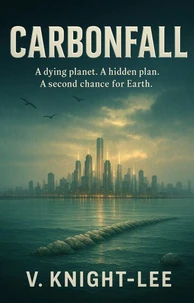In Tides of Tomorrow, New York learns a new grammar for water-not with speeches, but with schedules. When storms start arriving sideways and the harbor changes its mood mid-sentence, a small crew in Red Hook refuses catastrophe's script. Eleanor keeps a humble ledger of "receipts"-a bus arriving dry, a bakery bell ringing on time, a corridor that stays a corridor. Grace tapes rota cards to her sleeve and turns chaos into choreography.
Estelle, whistle queen, teaches calm with a look. Marcus reads the harbor's shoulder in thumb-widths and breaths. Nora translates law into handrails. Noah gives frightened hands three words that stop heroics from becoming headlines. Malik builds the lists that keep the lists honest. Daniel feeds the work. Olivia chooses verbs over spectacle. Across City Hall, Archer and Caldwell learn to carry proof into rooms that mistrust adjectives.
Even Stanton, a promenade developer with chrome instincts, discovers humility looks better on him than a plaque. They call their ethic Weave before Wall: maintain and teach first; build what you can defend at a bus stop. Soft defenses-modular reef frames, reflectors, shade, benches-work with hard choices-gate timing, thresholds, budgets. Drains get chalk eyes and names (hello, Lennie). Box-fan "dragons" turn smoke days breathable.
Rumors crash like wakes and get met with receipts. A barge scare becomes a training. Brownouts become a choir of generators and paper fans. Wind shifts; so does the plan. When a king tide threatens to write the neighborhood out of its own story, the crew hunts old maps and finds a hidden culvert-a "forgotten throat" paved into a parking lot. In a scene of quiet civic grace, a rusted wheel turns, the gate apologizes at the right moment, panels shoulder the shove, and the city remembers how to exhale.
The storm downgrades itself from plot to proof. This is climate fiction with its feet on the curb: hope as maintenance with names. Tools are ordinary-rope, radios, reversible mounts, chalk, keys-and so are the victories: kitchens spared, ankles unbetrayed, mornings kept. Politics smells like coffee and copy paper. The harbor speaks in softened consonants. Menhaden flash like commas when the sentence holds.
For readers who crave urgency without doom and optimism without amnesia, Tides of Tomorrow offers a near-future New York where community, craft, and coordination turn survival into culture. It leaves you with a handful of verbs you can take outside: tie the line, open the gate, keep the morning. And four words worth taping above your desk: remember rope.
In Tides of Tomorrow, New York learns a new grammar for water-not with speeches, but with schedules. When storms start arriving sideways and the harbor changes its mood mid-sentence, a small crew in Red Hook refuses catastrophe's script. Eleanor keeps a humble ledger of "receipts"-a bus arriving dry, a bakery bell ringing on time, a corridor that stays a corridor. Grace tapes rota cards to her sleeve and turns chaos into choreography.
Estelle, whistle queen, teaches calm with a look. Marcus reads the harbor's shoulder in thumb-widths and breaths. Nora translates law into handrails. Noah gives frightened hands three words that stop heroics from becoming headlines. Malik builds the lists that keep the lists honest. Daniel feeds the work. Olivia chooses verbs over spectacle. Across City Hall, Archer and Caldwell learn to carry proof into rooms that mistrust adjectives.
Even Stanton, a promenade developer with chrome instincts, discovers humility looks better on him than a plaque. They call their ethic Weave before Wall: maintain and teach first; build what you can defend at a bus stop. Soft defenses-modular reef frames, reflectors, shade, benches-work with hard choices-gate timing, thresholds, budgets. Drains get chalk eyes and names (hello, Lennie). Box-fan "dragons" turn smoke days breathable.
Rumors crash like wakes and get met with receipts. A barge scare becomes a training. Brownouts become a choir of generators and paper fans. Wind shifts; so does the plan. When a king tide threatens to write the neighborhood out of its own story, the crew hunts old maps and finds a hidden culvert-a "forgotten throat" paved into a parking lot. In a scene of quiet civic grace, a rusted wheel turns, the gate apologizes at the right moment, panels shoulder the shove, and the city remembers how to exhale.
The storm downgrades itself from plot to proof. This is climate fiction with its feet on the curb: hope as maintenance with names. Tools are ordinary-rope, radios, reversible mounts, chalk, keys-and so are the victories: kitchens spared, ankles unbetrayed, mornings kept. Politics smells like coffee and copy paper. The harbor speaks in softened consonants. Menhaden flash like commas when the sentence holds.
For readers who crave urgency without doom and optimism without amnesia, Tides of Tomorrow offers a near-future New York where community, craft, and coordination turn survival into culture. It leaves you with a handful of verbs you can take outside: tie the line, open the gate, keep the morning. And four words worth taping above your desk: remember rope.

 , qui est-ce ?
, qui est-ce ?